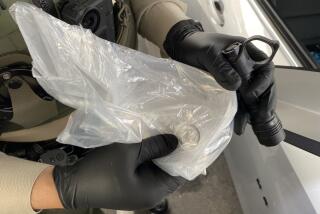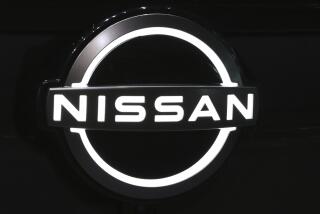Air-bag fraud a hidden concern
- Share via
When Joyce Webb bought her used 2001 Chevrolet Geo Prizm, she didn’t have a clue that she had become the apparent victim of air-bag fraud, a dangerous and costly scam.
For more than two years, the 57-year-old woman drove the car, confident there were factory-installed air bags that would protect her in an accident. Last month, Webb was horrified when she discovered the steering-wheel air-bag compartment had been stuffed with rags. The air bag on the passenger side was empty.
“It made me so mad. I wanted to know who did this,” says Webb, who lives in Orange. “The dealership didn’t tell me I was buying a salvaged vehicle.”
Webb discovered the air bags were missing when she took the Prizm to a different dealership to be serviced. Either an unscrupulous auto shop never replaced the air bags after an accident or they had been stolen, theorizes Jeff Kane, Webb’s attorney.
A check on the vehicle’s ownership history showed it had two previous owners, had been in an accident, then was repaired and resold, Kane said.
The dealership that sold Webb the salvaged vehicle should have known the vehicle’s status and was required to disclose that information to her before purchase, Kane says. The dealer denies any responsibility, and the two parties are trying to reach a settlement.
But Webb is not alone. Air-bag fraud and theft has become a dangerous problem that threatens lives and bilks vehicle owners and insurers out of millions of dollars, says Rosemary Shahan, president of Consumers for Auto Reliability and Safety, a consumer advocacy group based in Sacramento.
“Motorists need to be warned that there are some disreputable auto repair shops that install dummy or fake air bags to save money,” Shahan says.
Robert P. Hartwig, chief economist at the Insurance Information Institute in New York, estimates that more than 75,000 air bags are stolen each year in the United States.
There appear to be no comprehensive statistics on air-bag fraud and theft or the number of injuries suffered by unsuspecting motorists who thought they had functioning air bags, he says.
But as the number of vehicles featuring air bags soars and the cost of the devices increases, the black market for stolen air bags continues to thrive.
State Farm Insurance estimated in 1996 that stolen air bags cost insurers nationwide $50 million. In 2000, the Insurance Institute for Highway Safety said that more than 10% of all automobile theft claims involved the theft of air bags.
Since the cost of new air bags can range from $1,000 to $5,000, depending on the vehicle and how many bags it has, thieves can make a hefty profit by selling them to auto shops or directly to customers. Not only is it profitable, it can be easy: Removing a driver’s side air bag can be done in a couple of minutes.
Scams by disreputable auto repair shops can involve insurance companies or consumers being fraudulently billed for air-bag replacement that never gets done. If your vehicle is in an accident and the air bags deploy, insurance companies will generally pay for new bags to be installed.
Of course, it will be obvious if someone has broken into your car and ripped out the air bags. But unless you are hovering over the mechanic while your vehicle is being repaired, you could never know that instead of a functioning air bag, rags, cans or other junk were stuffed into the air-bag compartment.
If you suspect the air bags are missing, don’t try to open the compartment yourself -- you could be injured. Take the vehicle to a reliable auto shop.
California law makes it illegal for previously deployed air bags or repaired air bags to be installed in vehicles. Failure to install a new air bag is a misdemeanor punishable by a $5,000 fine and a year in jail -- not much of a deterrent, some critics say.
Bruce Strain, president of Supplemental Restraints Specialists Inc. of Long Beach, believes there needs to be legislation in the state that would require salvaged vehicles to undergo safety checks.
“A lot of these vehicles sitting in used car lots, we find that the air bag systems don’t work,” says Strain, whose company conducts investigations for insurance companies and attorneys. Air-bag fraud is particularly costly to insurance companies because of increased personal injury claims, he says.
Strain also warns that the safety hazard in air-bag fraud has a domino effect: Many newer vehicles have restraint systems that tie together seat belt and air-bag activation. If the air bags aren’t functioning, the seat belts will not restrain the car’s occupants during a collision.
*
How to spot problems
The National Insurance Crime Bureau offers the following tips to help prevent air-bag fraud and theft:
When you engage your ignition, a red SRS (supplemental restraint system) indicator should light up and flash a few times on the instrument panel display, indicating that the air-bag system is activated. If the light stays on, it means there are problems with the system. If no light comes on at all, it means the system is not activated and there may be no functioning air bag in the vehicle.
If possible, inspect the air bag prior to installation. If it is new, it should be packaged in a sealed container from the manufacturer.
Take a good look at the invoice to make sure the shop purchased the air bag from a manufacturer, dealer or recycler.
E-mail:Jeanrite@aol.com






